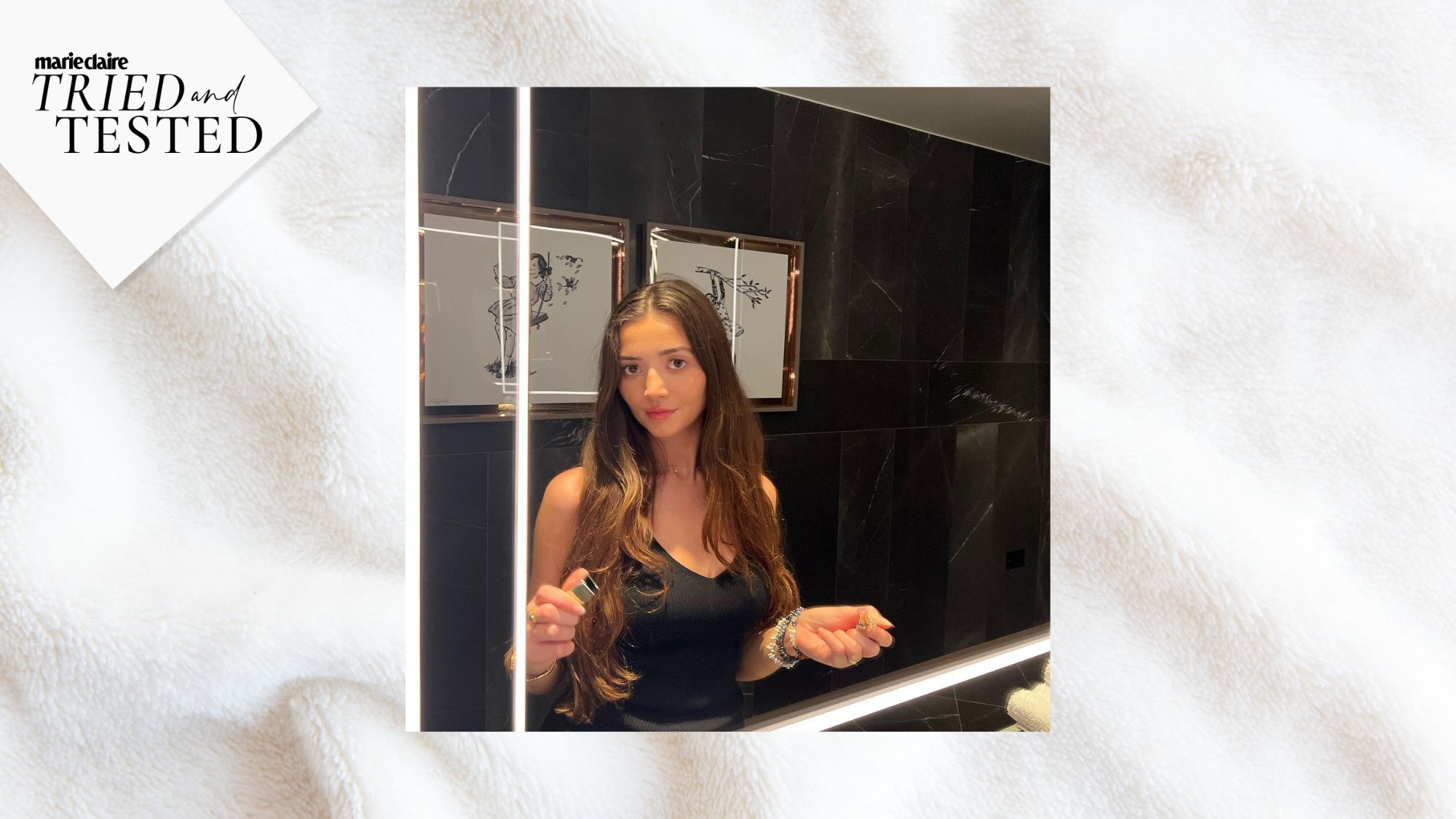Rejection therapy is trending on TikTok - so, I tested it for a month to see if it lowered my social anxiety
Was it worth a try?


Celebrity news, beauty, fashion advice, and fascinating features, delivered straight to your inbox!
You are now subscribed
Your newsletter sign-up was successful
Rejection is one of the hardest emotions to deal with for a girl with social anxiety like me. Often, hearing a "no" translates in my head to "you're just not good enough" - even if that's not the case at all. So when I saw rejection therapy on TikTok, I was intrigued.
With over 72 million views on the TikTok hashtag alone, rejection therapy started as a game. The idea of the rejection therapy challenge is to put yourself in situations where you will be told no, in turn becoming more accustomed and comfortable with the emotion.
One morning scrolling my feed, I came across a video of a woman on day one of her #rejectiontherapychallenge walking boldly into a mattress shop and asking to take a nap.
All I could think was, "I could never do that" - even the thought of being told no induces my anxiety symptoms. Yes, I've read all the best self help books, including Feel The Fear And Do It Anyway more times than I'd like to admit. That said, I felt I had nothing to lose from trying the rejection therapy challenge, so decided to give it a go.
Challenging myself to find out if being told no more could really boost my resilience, I set out on a month-long mission, asking top experts for their take, too. Keep scrolling as both Lee Pycroft Psychotherapist at Goldster and Karri Francisco, a therapist at APN explain the trending theory.
Don't miss our guides to journaling for anxiety and the best self care podcasts, while you're here.
I tried rejection therapy for a month - and the results were pretty surprising
What is rejection therapy?
I'll let the experts explain this one. "Rejection therapy is a term coined by entrepreneur Jason Comely, a self-proclaimed introvert who was consumed with concerns about rejection. He created a game out of it, inviting people to seek out rejection over a period of days and learn to accommodate the feelings of discomfort, expanding their window of tolerance to the feelings it activated, explains Pyrcoft.
Celebrity news, beauty, fashion advice, and fascinating features, delivered straight to your inbox!
"The method is a type of self-help psychological treatment that can help a person face their fears of rejection by exposing them to varying situations where they confront that fear," Pycroft continues.
So, what's the difference between this and traditional exposure therapy? Well, rejection therapy has been somewhat gamified and the stakes, shares the expert. "If trying, make sure to keep it at a level where you stretch your comfort zone without becoming emotionally overwhelmed. Having a support system in place is wise too," advises Pycroft.
Be warned, too - "neither involved in the development are licensed mental health providers," points out Francisco. That said, she goes on to explain it has similarities to CBT therapy. "The premises of this therapy aligns somewhat with Cognitive Behavioural Therapy, where the goal of the interaction is to create a new behavioural response; CBT would further build on this to also create insight into thoughts and feelings that influence the behaviour."
So, does it actually work? "Hypothetically, there could be a benefit to this approach. We have data from CBT and exposure therapy - two clinically reviewed treatment models - that suggest it could incite behavioural change," suggests Francisco.
That said, trying it comes with a warning. "As a licensed marriage and family therapist at APN, I would not recommend someone exploring this without also being under the care of a licensed mental health professional," stresses Francisco. "Underlying trauma could make this dangerous for an individual to attempt without support and may increase symptoms of depression or anxiety." Our guide to how to find a therapist might come in handy here.
How does rejection therapy work?
In simple TikTok terms, it's as simple as going outside and doing something that you'll likely be told "no" to. Then, get used to the feeling of being told no.
"By intentionally seeking out rejection, individuals may become desensitised to the fear and discomfort associated with it. This process may lead to a willingness to explore other difficult areas within one's life," explains Francisco.
It's important to note here that rejection therapy is a personal development exercise and needs to be approached with caution, as above. "While it may be a valuable tool for some, it's not suitable for everyone, and individuals should consider both their comfort levels and boundaries and seek the guidance of a licensed mental health provider before immersing themselves in the activities suggested." she continues.
Benefits of rejection therapy
Did you know? Pycroft explains that the habit of being rejected in subtle ways can build self-awareness about your own behaviour and resilience, in turn helping you learn to be more confident in going for what you want in life.
Benefits span:
- Increased self-awareness
- Resilience
- Confidence boosting
- Personal growth
- Can help with overcoming social anxiety
"That said, challenges can arise if you're attempting to resolve a deeper vulnerability without guidance from a therapist or a support system," he warns.
What I learnt when I tried rejection therapy for a month
In short: a lot. My fear of rejection is so real I can't even reject other people. Seriously, saying "no" is a real task for me. While I'm a "rejection is protection" and "rejection is redirection" kind of girl to my friends, I personally deal with rejection by pretending it never happened.
That said, after watching countless videos of the rejection therapy challenge, I had to try it for myself. The best TikTok videos always happened in a coffee shop so it seemed like the best place to start for me.
Heading into a coffee shop I go to every morning on my way to work, I walked in for my mid-morning mocha with my first rejection therapy challenge in mind. My heart was racing so fast, I genuinely considered skipping my caffeine fix.
I wasn't going to ask a stranger for £100 or a hug like in the other TikTok videos I had seen - rather, my plan of rejection was to simply ask if I could have my oat milk for free. Yes, because Pret does and because the old vegan in me was screaming out at the injustice of it all. On a usual day, I would never have the courage to ask for anything for free - but today was no different.
Calling my friend for moral support on the way, I spotted that there was only one other person sipping their coffee and thanked the universe. Politely asking if I could have my oat milk for free, as soon as I heard the "no, sorry" in return, I was surprised to feel an overwhelming sense of relief and calm. Worryingly calm, in fact for someone who had felt so nervous at the thought of even asking. I walked out smiling, laughing and liberated. Sure, it took me ten minutes to calm down and two days to pluck up the courage to do it again, but it worked - and really didn't feel that bad at all.
For the rest of the week, seeking rejection really did feel like a game and one I enjoyed playing, at that. I became braver each time and could laugh about it when I heard a no (some of the reactions were actually really funny).
I started wondering if rejection therapy would work when it came to my dating life. If I started seeking out rejection, would my dating anxiety disappear forever? As Pycroft and Francisco pointed out, it's important to seek professional help, too, so I made sure to consult with my therapist, Jordan Dixon, while trying it.
Dixon assured me that rejection therapy probably can work for relationships, too, but the way she spoke about rejection completely changed the way I thought about it.
"The term rejection means different things to different people due to our different experiences and the socio-cultural associations with it," she shared. It's absolutely human that rejection might scare us and we may want to avoid it."
Not just that, but "rejection can destabilise our need for belonging, those with attachment ruptures in childhood can be unsettled by rejection. Attachment styles play a big part in how many of us perceive rejection."
It made me realise that although the rejection therapy challenge was fun, the key learning was not growing more comfortable with being told "no," but reflecting on why I fear rejection so much to begin with. "Typically, when a client may have limitations in their mindset due to a fear of rejection, I may gently ask them some reflective style questions that prepare them for things not going in the way they think they are going to," Dixon told me.
"Rejection is a part of everyday life and if you are stunted by it, it can stunt your personal growth," she goes on. "Rejection doesn’t have to mean we are “bad” per se or not enough - it can often mean that we have a difference and that's okay."
Bottom line: there is much to be said for growth in the discomfort.
Come the end of the month, I felt like I'd learnt a lot about who I was, how I handle rejection, and why I was afraid of it, in the first place. It taught me that I have nothing to fear (not to mention, I'll certainly be asking why we vegans can't get free oat milk more often, too).
At the end of the day, what do we have to lose? It's just rejection after all.

Dionne Brighton is the Social Media Editor at Marie Claire UK. After writing about everything from nail trends to celebrity style moments for Marie Claire UK, Glamour UK and Woman & Home, she now leads the brand’s social strategy. Her work transforming Marie Claire UK’s social platforms earned her a BSME Talent Award nomination.